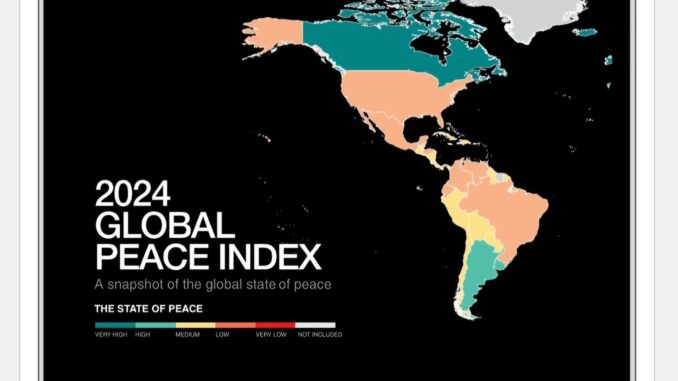Sierra Leone’s reputation as a beacon of peace and democracy in West Africa has been significantly challenged in recent years. A country that was proudly rated as the third most peaceful country in Sub-Saharan Africa and 35th most peaceful country in the world in 2018 has deteriorated to a point where it’s now ranked eighth in the region and 66th globally, according to the Global Peace Index (GPI). Sierra Leone’s decline in the Global Peace Index, which ranks 163 independent states and territories according to their level of peacefulness, underscores the mounting problems with peace and security in the country.
On the democracy front, the country continues to make a downward trajectory in the Economist Intelligence Unit’s (EIU’s) Democracy Index, dropping seven places from 96th in 2022 to 103rd in 2023, landing among the ten worst performers globally. Sierra Leone’s overall score in the Democracy Index fell sharply from 5.03 in 2022 to 4.32 in 2023. This decline is largely attributed to a significant drop in scores for electoral process and pluralism, as well as political culture. The attempted coup on November 26th further exacerbated the country’s political fragility.
The EIU’s Democracy Index, which assesses the state of democracy across 165 countries and two territories, utilises 60 indicators grouped into five categories: electoral process and pluralism; civil liberties; the functioning of government; political participation; and political culture. Based on its score, each country is then classified as one of four regime types: “full democracy,” “flawed democracy,” “hybrid regime,” or “authoritarian regime.”
Sierra Leone is presently classified as a “hybrid regime”. A hybrid regime is defined as one in which the electoral system is largely characterised by fraud and irregularities, and election results are often disputed. The report further describes that such regimes often involve government pressure on opposition parties and candidates, widespread corruption, a weak rule of law, and a suppressed civil society, including harassment and pressure on journalists, and a lack of judicial independence.
The report states, “A substantial decline in the electoral process and pluralism category was driven by the cascade of successful and attempted coups in 2023.” This trend is not unique to Sierra Leone, as eighteen out of 44 countries in the region experienced a decline in their scores. The sharpest declines were recorded in Niger (-1.36), Gabon (-1.22), Sierra Leone (-0.71), Mali (-65), and Madagascar (-44).
The EIU’s Democracy Index isn’t just a ranking; it’s a warning sign. Pundits say Sierra Leone’s decline suggests a weakening of democratic institutions and a potential rise in authoritarian tendencies, with real-world consequences for citizens, including limited freedoms, potential for violence, and economic uncertainty.
“These reports point to a worrying trend of democratic backsliding across Sub-Saharan Africa. Sierra Leone is not alone in this struggle, but the stakes are high. The international community and Sierra Leoneans themselves must work together to reverse this decline and protect the hard-won gains of peace and democracy,” said rights activist Marcus Bangura.




